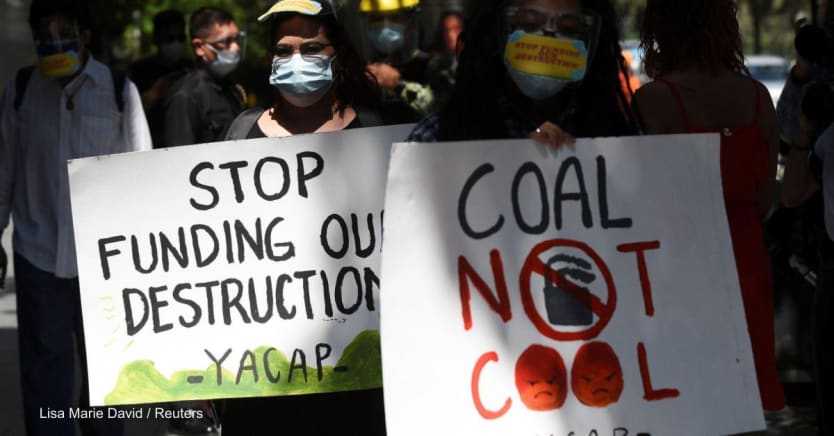
In July 2016, environmental activist Gloria Capitan was brutally killed in front of her 8-year-old grandson in the Bataan province of the Philippines, allegedly due to her anti-coal advocacy as the leader of the Coal-Free Bataan Movement. Climate change is perhaps the biggest threat that humanity faces, yet the people who devote their lives to this cause are under attack. Last year, the majority of activists killed around the world were land and environmental defenders, and the Philippines is among the deadliest places to do this work.
Up against powerful government and corporate interests, the last thing these advocates need is to be fighting the influence of development finance institutions such as the World Bank and its private lending arm, the International Finance Corporation. Sadly, in many cases they are.
Sign up for Devex Invested
The must-read weekly newsletter that keeps you up to date with news about business, finance, and the SDGs.
A recent report from IFC’s internal watchdog is highly critical of its climate and human rights impacts. A yearslong investigation by the Compliance Advisor Ombudsman found that IFC helped finance the construction of at least 10 new coal-fired power plants in the Philippines since 2011. It did so through its investments in a financial intermediary, Rizal Commercial Banking Corporation, which became a leading financier of the Philippines’ coal boom after IFC took a 12% equity stake in the bank.
The investigation report finds that IFC failed to ensure that its client RCBC adhered to social and environmental protections, likely resulting in air and water pollution that caused health problems and displaced community members. As one protester’s sign read at a recent demonstration against the plants, IFC money has “destroyed our seas” — a critical resource for the island nation and communities that rely on fishing for income.
Meanwhile, local community activists say they have faced reprisals as a result of their opposition to the projects. The report also notes that the plants financed on IFC’s watch will produce an estimated 40 million metric tons of carbon dioxide each year, equivalent to 30% of the country’s total emissions in 2019. For an institution with a mandate to promote sustainable development, that is an astounding contribution to global emissions in the midst of the climate crisis.
How seriously IFC takes these findings, and how much it is willing to invest in an effective response, will have huge implications — for development finance, for the right to remedy for communities saying they’ve been harmed by World Bank Group investments, and for the fight against climate change.
The report is clear that IFC is in part responsible for negative project outcomes and recommends that it contribute to remedy, including by repairing the harms suffered by affected communities, reducing greenhouse gas emissions from the plants, and undertaking the systemic reforms necessary to prevent similar impacts in the future.
That includes instituting new measures to plug accountability gaps in its indirect lending operations, which human rights and environmental advocacy groups say contribute to human rights abuses and support coal and other fossil fuel expansion — not just in the Philippines but around the world. These operations make up the bulk of IFC’s business, and CAO has repeatedly found that they are systemically noncompliant with the bank’s policy on environmental and social sustainability.
Responding to this report, IFC leadership has an opportunity to demonstrate its commitment to climate risk mitigation and remedy for affected communities, two of the most pressing challenges that IFC Managing Director Makhtar Diop is facing today.
In April, IFC’s board of directors approved a management action plan that goes part of the way toward addressing the concerns raised by the investigation, but the proof will be in how it implements the plan in the coming year. In this case, a meaningful response will include:
Taking stock of Makhtar Diop’s first year leading IFC
Devex speaks with Diop and some IFC observers to find out how he's done in his first year and what's next.
• Providing reparations for communities adversely affected by coal plants that are already operational and have received funding from IFC intermediaries. What remedy looks like should be determined through robust and meaningful consultations with the affected communities.
• Doing all it can to mitigate the ongoing impact of the coal plants, by reducing their greenhouse gas emissions and contribution to air and water pollution.
• Committing to reduce its impact on climate change in line with the Paris climate agreement's goal of keeping global warming below 1.5 degrees Celsius. This means stopping support for fossil fuels and increasing financing for sustainable renewable energy.
• Fully implementing CAO’s recommendations to address the underlying systemic problems with IFC’s approach to financial intermediary lending, including by systematically disclosing all high-risk subprojects supported with IFC funds and ensuring that banking and private equity clients have the capacity, resources, and understanding of what is needed to fully apply IFC performance standards to their operations.
On the most basic level, the question is whether IFC can fix what it breaks. If the answer is yes, the future is brighter not just for affected communities in the Philippines, but for us all and for the planet.











